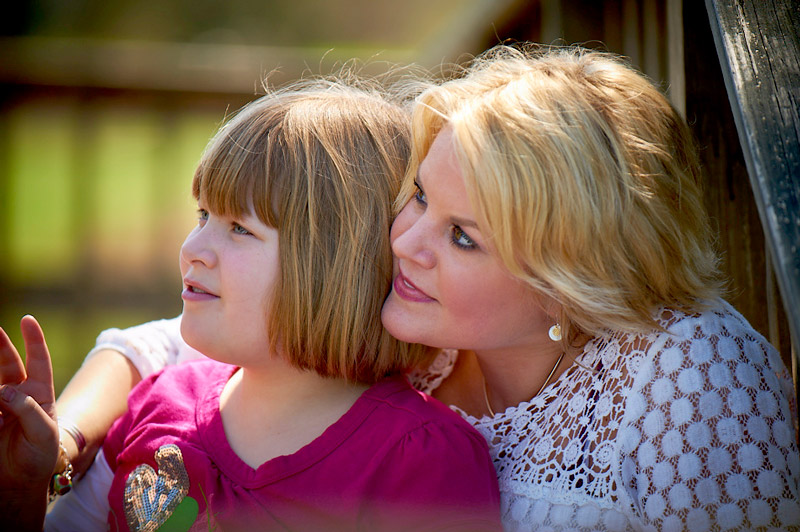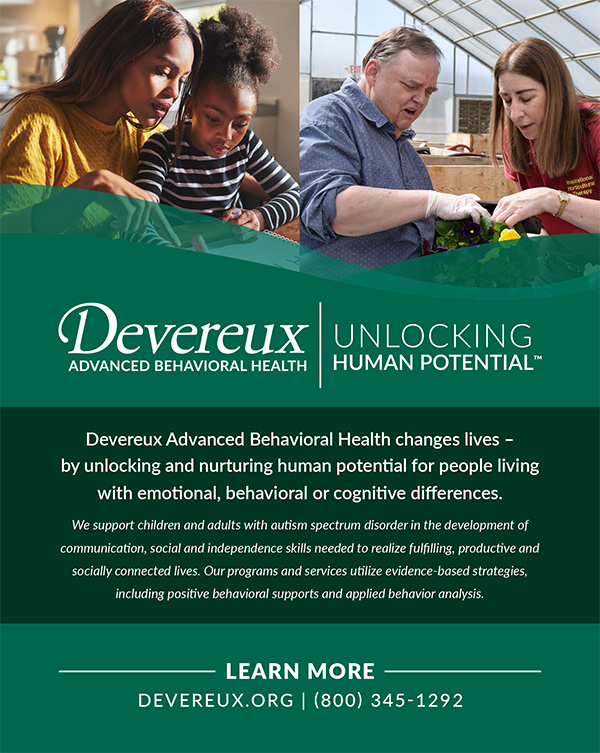Over the last decade, there has been an increase in autistic self-advocates coming into the public eye through their incredible means to advocate for themselves – and others like them. These individuals have become a powerful voice for boards, committees, research and quality improvement initiatives across major organizations and groups. Truly, it is an exciting time to see the important insights and contributions autistic self-advocates bring from their lived experiences.

Amy Kelly, Devereux’s National Director of Family Engagement, and her daughter, Annie
When my daughter, Annie, was diagnosed with autism nearly 20 years ago, the only thing people could relate to the word “autism” was the movie Rain Man, in which Dustin Hoffman plays the character of Raymond, a man with autism who was also a gifted savant. Today, we have a greater understanding about the full and diverse autism spectrum, and the uniqueness of each individual.
Annie, who is almost 21-years-old, has autism and intellectual disabilities, and is minimally verbal due to a speech disorder called verbal apraxia. As her mother, I am thrilled to see the progress in the advocacy realm of the autism world. But I am also keenly aware that the “Annies” in the world, like my daughter, still don’t have their own voices. I am her voice. And I am her advocate.
Below are a few suggestions that can help others advocate for those who have no voice, who are non-speaking or who are limited in their verbal communication:
Remember, you are the expert on your child/loved one – As the primary caregiver and/or family member (parent, grandparent, sibling, neighbor, etc.), you know your person best. You are able to care for your child or loved one because you have figured out how to understand them – even if you’ve had to endure mistakes or tantrum behaviors. (We all have!) Try and tap into that knowledge to advocate on their behalf.
Teach your audience about your loved one’s autism – Often, people associate one idea with autism (e.g., Rain Man) because they haven’t learned or experienced otherwise. Talk to your audience – doctors, teachers, and community partners – about your child or adult. Share their strengths, challenges, and areas of need. Provide detailed examples and tell stories. By describing your child or loved one in an illustrative way, people will better understand and remember what you shared with them.
Try new ways to understand your child or adult’s position on various topics – If you have a loved one who is nonspeaking, you have learned communication comes in many forms. Through challenging behaviors – such as tantrums, turning one’s head, pushing something away and ripping something up – we understand our individuals are communicating displeasure. They also can show happiness in unconventional ways, such as flapping their hands, jumping up and down, and making high pitched sounds. When this happens:
- Consider offering alternatives with pictures and words to explain things more clearly (e.g., icons, lists or social stories) and allow your individual to point at what they like or don’t like.
- Offer paper and pen so your loved one can write their thoughts, if they are able.
- Allow them to use a computer or tablet to type or search for things of interest and priority.
- Listen for sounds (squeals or grunts) and watch for physical cues like hopping up and down, clapping or waving hands, or smiling and frowning.
There are so many ways to communicate and, as the caregiver and/or family, it is our job to interpret and decipher their needs and wants so we can share these viewpoints with others. This is advocacy. Plain and simple.
Understand possible ways to advocate – There are many ways to be an effective advocate: Advocacy at a personal level or at the local, state, or federal levels. Understanding the systems of care at each of these levels is important and can be a mighty task to master. Think about the medical system, the educational process, funding and waiver structures, and disability rights. Understanding these areas fully will allow for productive, successful advocacy.
Regardless of where you are in your journey with your loved one, know that the small things you do to advocate for them are the big things. Your child or loved one needs and depends on you to help the rest of the world understand who they are, and what they need to grow and thrive.
What a privilege and honor it is to represent these wonderful and unique individuals.
Amy Kelly, MBA, MNM, is National Director of Family Engagement at Devereux Advanced Behavioral Health. Amy is the mother to Danny, Annie, and Ryan. Annie is diagnosed with moderate to severe autism, verbal apraxia, intellectual and developmental disabilities, and general anxiety disorder. Amy is the National Director of Family Engagement for Devereux Advanced Behavioral Health, one of the nation’s oldest and largest nonprofit providers of behavioral healthcare and serves as a family representative on several special needs boards in the community, locally and nationally. In addition, she participates with other patients and families in efforts supported by the Autism Care Network and serves on an executive committee for the American Academy of Pediatrics, to assist children and adolescents with special needs and the importance of quality care.





